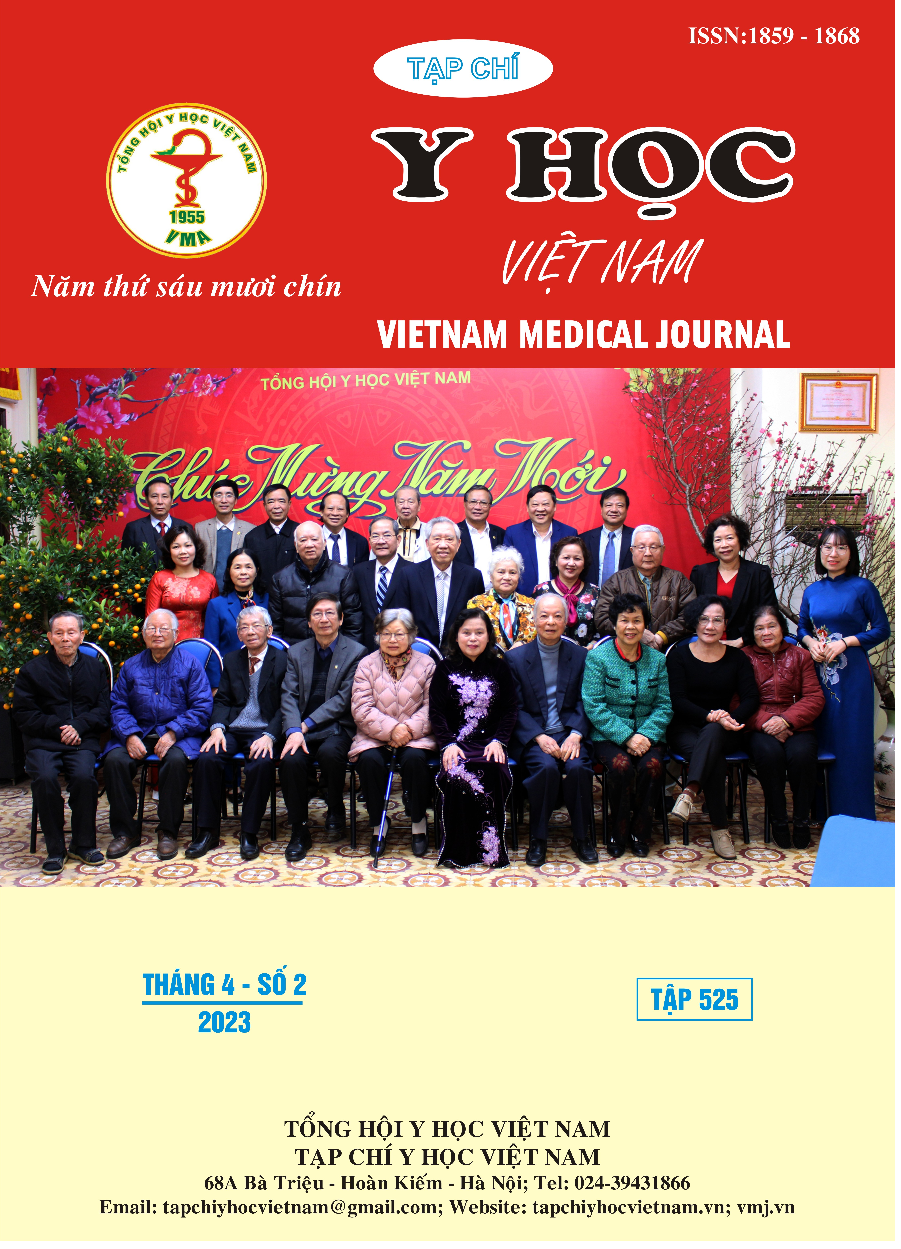THE EFFICACY OF GEMCITABINE-CAPECITABINE REGIMEN IN THE PANCREATIC ADENOCARCINOMA TREATMENT AT K HOSPITAL
Main Article Content
Abstract
Objectives: To evaluate the efficacy of gemcitabine-capecitabine regimen in the pancreatic adenocarcinoma treatment at K hospital. Patients and methods: Retrospective and retrospective descriptive study of 36 patients was diagnosed locally advanced or metastatic pancreatic adenocarcinoma at K hospital from January 2017 to April 2022. Results: The mean age was 57.2 years. The male/female ratio was 1.6/1. Patients with N1 and N2 lymph nodes stage were 44.4% and 19.4%, respectively. The rate of tumor stage T2, T3 and T4 were 16.7%, 36.1% and 47.2%, respectively. Patients with distant metastases accounted for 69,4%. We found that none of patient showed a complete response, the partial response rate was 27.8%, 25.0% of the patients were stable and 47.2% of the patients had progressive disease. The median progession-free survival was 5.5 months (95% Cl, 4.6 to 6.4 months). The median overall survival was 8.5 months (95% CI, 7.8 to 9.2 months). The rate of grade 1/2 neutropenia was 33.3%, grade 3/4 neutropenia was 2.8%. Anemia toxicity occurs quite low, mainly grade 1/2 anemia accounts for 27.8%, no patient had grade 3/4 anemia. Thrombocytopenia also occurred low with 16.7% of patients with grade 1 thrombocytopenia, no patients had grade 2, 3, and 4 thrombocytopenia. Conclusion: The gemcitabine-capecitabine regimen is highly effective, tolerable by the patient. So, it can be widely applied in clinical practice in the treatment of locally advanced or metastatic pancreatic adenocarcinoma.
Article Details
Keywords
Pancreatic cancer, gemcitabine-capecitabine, progession-free survival, overall survival
References
2. Sung H, Ferlay J, Siegel RL, et al. Global Cancer Statistics 2020: GLOBOCAN Estimates of Incidence and Mortality Worldwide for 36 Cancers in 185 Countries. CA Cancer J Clin. 2021; 71(3):209-249.
3. Global Cancer Statistics 2020: GLOBOCAN Estimates of Incidence and Mortality Pancreatic cancer in Viet Nam.CA Cancer J Clin. 2021.
4. Siegel RL, Miller KD, Jemal A. Cancer statistics, 2018. CA Cancer J Clin 2018;68:07–305. Brune K.A., Lau B., Palmisano E. và cộng sự. (2010). Importance of Age of Onset in Pancreatic Cancer Kindreds. JNCI J Natl Cancer Inst.
5. Cunningham D, Chau I, Stocken DD, et al. Phase III randomized comparison of gemcitabine versus gemcitabine plus capecitabine in patients with advanced pancreatic cancer. J Clin Oncol 2009;27:5513–8.
6. Neoptolemos JP, Palmer DH, Ghaneh P, et al. Comparison of adjuvant gemcitabine and capecitabine with gemcitabine monotherapy in patients with resected pancreatic cancer (ESPAC-4): a multicentre, open-label, randomised, phase 3 trial. Lancet (London, England) 2017;389:1011–24
7. Lee HS, Chung MJ, Park JY, et al. A randomized, multicenter, phase III study of gemcitabine combined with capecitabine versus gemcitabine alone as first-line chemotherapy for advanced pancreatic cancer in South Korea. Medicine (Baltimore). 2017;96(1):e5702.
8. Xiao BY, Wang BC, Lin GH, Li PC. Efficacy and safety of gemcitabine plus capecitabine in the treatment of advanced or metastatic pancreatic cancer: a systematic review and meta-analysis. Ann Palliat Med. 2020;9(4):1631642-1631642.
9. Đặng Thị Vân Anh. Nhận xét đặc điểm lâm sàng, cận lâm sàng và kết quả hóa trị trên bệnh nhân ung thư tụy tại bệnh viện K. Luận văn Bác sỹ nội trú. Đại học Y Hà Nội.2012.
10. Hoàng Minh Lý. Đánh giá kết quả điều trị và một số yếu tố liên quan trên bệnh nhân ung thư tụy giai đoạn muộn tại bệnh viện K. Luận văn Bác sỹ nội trú. Đại học Y Hà Nội.2021.


